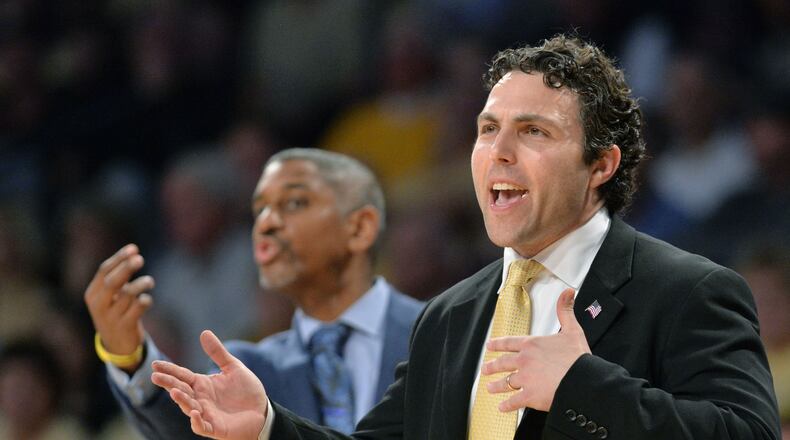Josh Pastner could be excused for wanting to wag his finger or take a victory lap, hoisting aloft his new ACC coach of the year trophy. His final years at Memphis were rough. He took a beating in local media. Fans questioned his ability to coach and wanted him out.
When he left Memphis after seven years as head coach for Georgia Tech last April, there was joy over his departure. Eleven months later, Pastner is the toast of ACC basketball. Expected to be among the weakest power-conference teams in the country, the Yellow Jackets finished the ACC season 8-10 with wins over North Carolina, Notre Dame and Florida State. The league’s hall of fame coaches, Syracuse’s Jim Boeheim, Duke’s Mike Krzyzewski, Louisville’s Rick Pitino and North Carolina’s Roy Williams, have hailed his work.
Given the opportunity to savor the last laugh, Pastner said instead that he believed in two things.
“I don’t believe in wishing ill will or playing the ‘I told you so’ game, and secondly, man, I really try to stay out of holding onto resentment or anger,” Pastner told the AJC. “The person that holds on, the one that is angry or has resentment, it’s like holding a hot piece of coal. You’re the one that gets burned.”
There are other matters needing his attention. Tech was scheduled to open ACC tournament play Tuesday night with a first-round matchup at the Barclays Center, a meeting of the No. 11 seed Jackets and No. 14 seed Pittsburgh. To have a shot at making their first NCAA tournament since 2010, the Jackets probably need to win at least two games, Tuesday against Pittsburgh and then Wednesday night against No. 6 seed Virginia, and possibly against No. 3 seed Notre Dame Thursday night.
Rather than harbor resentment towards Memphis, Pastner expressed gratitude “because I loved my seven years there, and without Memphis, and even with all the stuff with it, including the media, I wouldn’t be the head coach at Georgia Tech in the ACC, and I recognize that.”
The perspective is perhaps the influence of his wife Kerri. She saw her husband be subjected to unrelenting criticism but maintain his positive attitude in the face of it. A woman of faith, Kerri said this season is the blessing.
“I always tell Josh, it’s not a modern miracle,” she said, invoking a phrase he has repeated frequently to describe the season. “I think it’s just God’s work.”
By the end of last season, Memphis was boiling over. After four consecutive trips to the NCAA tournament, the Tigers went 18-14 and then 19-15 to miss the postseason in Pastner’s final two seasons. Fairly or not, fans were aggravated and didn’t hide it in a city where Memphis basketball matters far more than Tech’s team does in Atlanta. Pastner said he accepted the criticism as part of the job, but bore the disappointment personally.
“Every loss, it was so agonizing to me,” he said. “And it still is. But I’m trying to handle it better.”
Leaving Memphis was freeing, even to go to a team that had just lost its four best players. Perhaps even because of that fact, as it lowered the expectations.
“I knew what I wanted to do and how to get it done,” Pastner said. “My vision of how I wanted to play was so much more clear, and I just think I wanted to get a fresh start to allow that vision to happen.”
He hired a first-rate staff, Tavaras Hardy, Darryl LaBarrie and Eric Reveno. He has said previously that one lesson learned from Memphis was the importance of having everyone in the program aligned with his vision. He learned from mistakes made as a first-time head coach, one who began the job at the age of 31. Not taking losing so hard was among them.
“I know this sounds stupid, but I thought I stressed so much (in Memphis) that I could feel the clogs in my arteries,” Pastner said.
Thus far, with lowered expectations and a team that has crushed them, Pastner is in a better state of mind.
“He’s happy again,” said Pastner’s wife Kerri. “He’s enjoying himself again and that for me was really fun to watch.”
Like most of his fellow Atlantans, Pastner isn’t big on the traffic, but he appreciates not being under the same microscope that he was in Memphis.
“This gives me a little freedom to move around a little bit more,” he said. “Move around, win or lose. You go somewhere to eat, and people might say, ‘Hey, Coach, what’s happening?’ but there’s other things going on in the city. And so I’ve enjoyed it. I really have.”
And perhaps there’s a little bit of satisfaction from showing the basketball world that he’s a better coach than many thought.
“Does it feel good that he won coach of the year after hearing for (seven) years that he couldn’t coach?” Kerri Pastner asked. “Heck, yeah.”
About the Author
Keep Reading
The Latest
Featured



